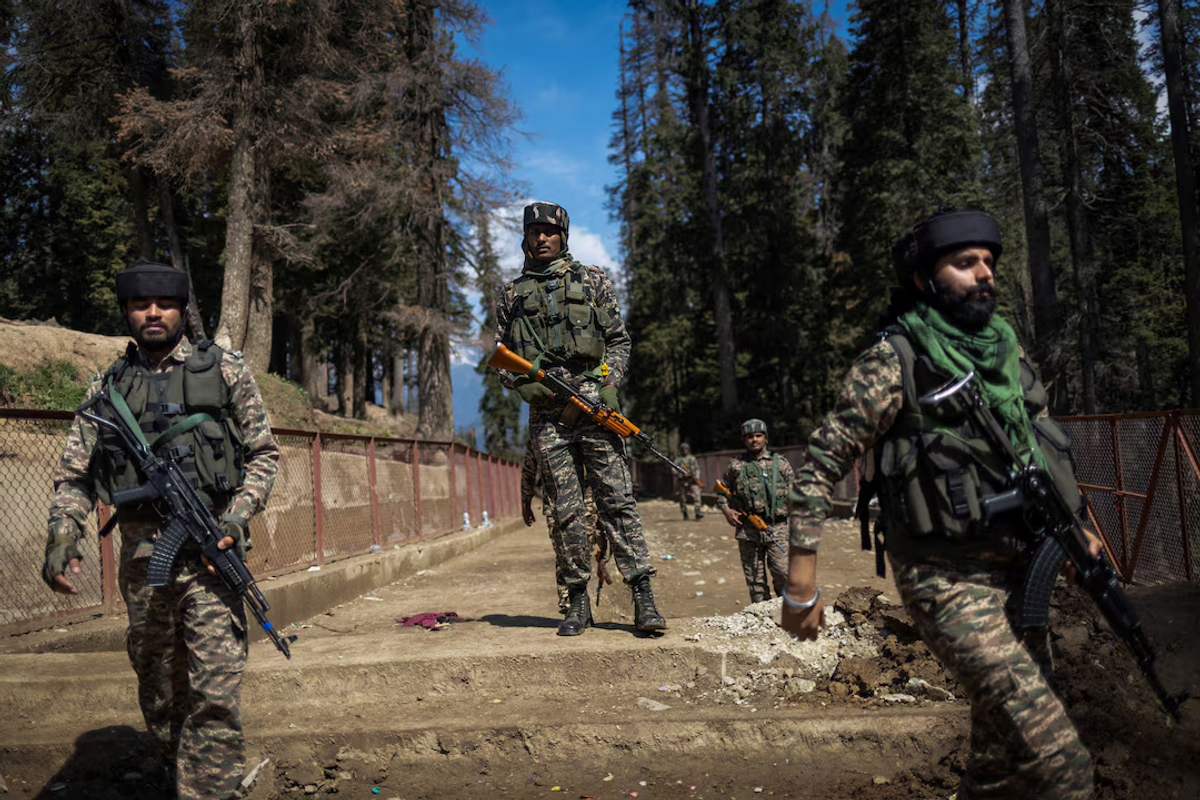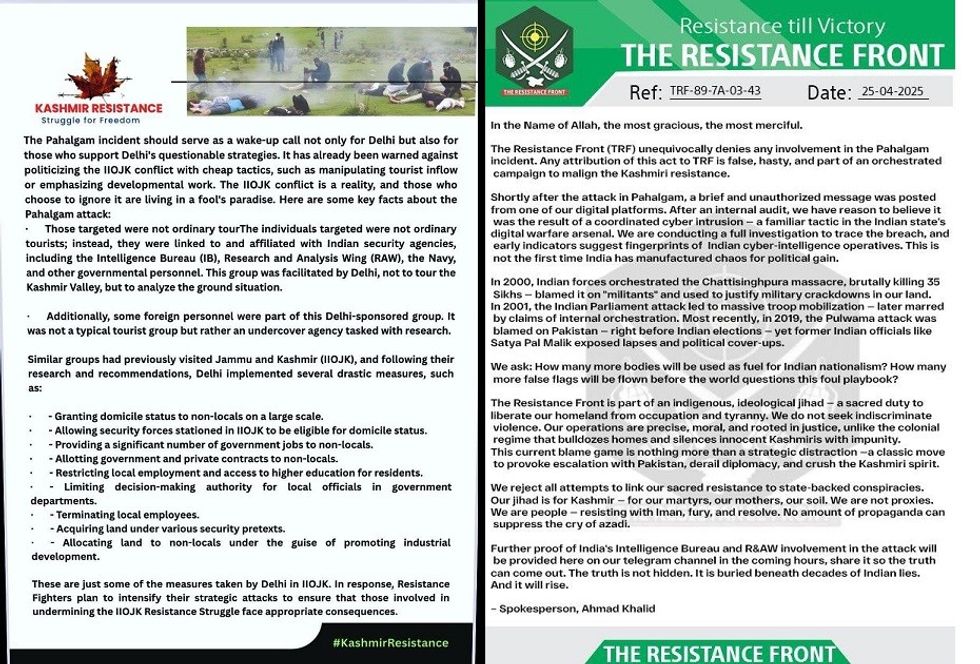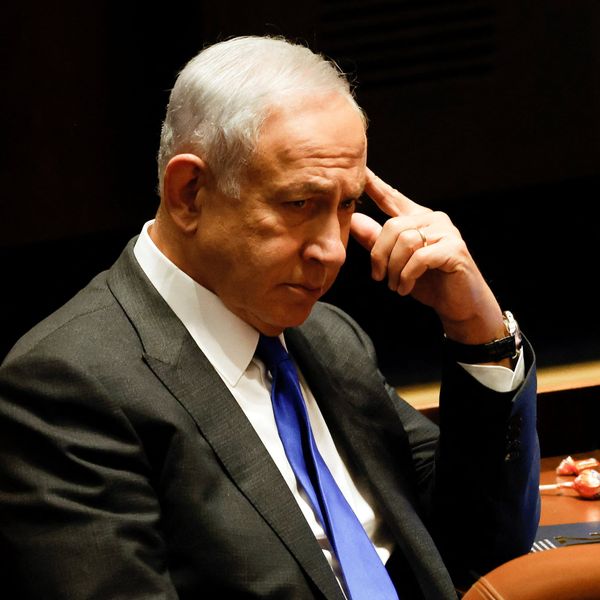Pahalgam attack: A tragedy that raises more questions than answers
Like many before it, the Pahalgam attack is likely to fade into the archive of the unresolved — unanswered and unaccounted for
Sheraz Khan
Senior Producer, Monitoring Desk
Sheraz Khan Rajput is a veteran journalist with nearly two decades of experience in broadcast and digital media, specializing in breaking news, scriptwriting, research, and fact-checking.

Indian security force personnel stand guard at the site of a terrorist attack on tourists in Baisaran near Pahalgam in south Kashmir's Anantnag district.
Reuters
The Pahalgam attack, where 26 people -- mostly Indian tourists -- were gunned down in broad daylight, stands as the deadliest attack in Indian-administered Kashmir in more than two decades. What followed, however, was not clarity but confusion and chaos.
Within hours, Indian media outlets and social media accounts pointed to The Resistance Front (TRF), a shadowy militant group, as the perpetrator. Their claim hinged on an alleged TRF statement that circulated online shortly after the attack. But just days later, a second message — also attributed to TRF — surfaced, this time denying any involvement.
The group called the initial claim a “cyber intrusion,” fabricated by the Indian government!
A name resurrected
The Resistance Front is not new, nor newly feared. It surfaced in 2019, just as New Delhi tore down Kashmir’s autonomy by revoking Article 370. Since then, TRF has largely developed a reputation for urban warfare tactics.
However, its visibility has significantly declined in the past years following the targeted killings of its senior leadership by Indian forces. And yet, this seemingly fragmented militant outfit, managed to launch one of the most complex militant attacks in the region’s history? even if we set aside logic of this claim, why TRF? And why now?
A convenient culprit
Because "lies require noise and misdirection." Since the abrogation of Article 370, the Modi government has trumpeted a narrative of restored normalcy in the IoK. But that claim was obliterated by the recent attack in Pahalgam. Global headlines told the story plainly: The New York Times declared, “The attack shattered the illusion of calm in Kashmir,” while Al Jazeera reported, “‘Burst balloon’: How Pahalgam attack shattered Modi’s Kashmir narrative.” To shield itself from such criticism—the Modi-led BJP government needed a scapegoat. Enter TRF.
Smoke, mirrors, and the mirage of normalcy
The script is wearing thin. Even India's allies seem wary of the charade. Russia urged both countries to exercise restraint. The U.S., always cautious, advised dialogue. Not war. At home, disbelief is louder. General Shankar Roychowdhury, a former Indian Army chief, didn’t mince words. He called it what it was: an intelligence failure.
Veteran journalist Rahul Bedi went further in The Wire, highlighting the complete collapse of a security grid that, by India’s own claims, spans three layers — police, military, paramilitary — in a region bristling with surveillance.
The attackers, disguised as Indian soldiers—trekked over 20 hours through tough terrain, armed with AK-47s, fired for nearly 20 minutes, and disappeared into the forest. No drones caught them. No cameras saw them. The closest security forces took almost an hour to respond. Yet, within minutes, India pointed fingers at Pakistan.
A narrative in ruins
The Resistance Front (TRF) is now largely defanged, with little to no activity on its online channels. Blaming the group achieves little, except serving the Indian government’s narrative — one that conveniently shifts focus across the border. In times of political embarrassment, Pakistan often becomes New Delhi’s "get out of jail free" card.
The politics of denial
With TRF now irrelevant both strategically and online, its primary role seems to be that of a scapegoat. The Indian government frequently deflects from internal crises by pointing fingers at Pakistan. For the Modi administration, Kashmir is not just a conflict zone — it’s a political stage, where tragedy is often repurposed not to seek truth, but to sustain a narrative.
Like many before it, the Pahalgam incident will likely disappear into the archive of the unresolved — unanswered and unaccounted for. As Praveen Donthi of the International Crisis Group told Al Jazeera, “Projecting this as a security crisis entirely fueled by Pakistan may be politically useful domestically, but it won’t help resolve the conflict.”








Comments
See what people are discussing